When winter settles in around these parts, daylight doesn't seem to last too long. So like moths we tend to get excited about the new bright and shiny toys we bring in. Today we have Super Bright LEDs - they're the nifty little units we put in the HexPummer Lantern to create that extra pulse […]
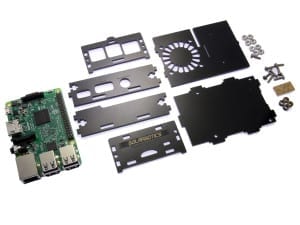
Solarbotics Raspberry Pi 3 SAFE Assembly...
The instructions for assembling the Pi v3 and the previous acrylic Pi SAFE are quite similar. The only difference between the models is the location of the LED light pipes, so these Pi3 instructions apply generally to all Pi SAFE versions.
1. Your Parts!

- 8 x 4-40 nuts
- 8 x 4-40 x 3/8" bolts
- 2 x Clear acrylic light-pipes
- 4 x Black acrylic spacers
- 6 x Black acrylic SAFE sides (shown here with brown protective paper already removed)
- 0 x Raspberry Pi (sorry - not included in the kit!)
2. The Baseplate
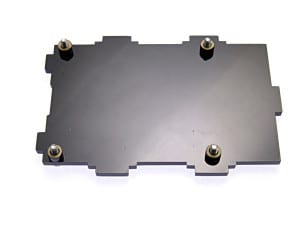
Find 4 of the 4-40 x 3/8" bolts, and put them through the baseplate, and press the spacers on from the other side. Thee bolts will sort of stay put until you can get the Raspberry Pi on the baseplate. (If adding to a VESA mount, do only 2 diagonal screws)
3. Adding the Raspberry Pi
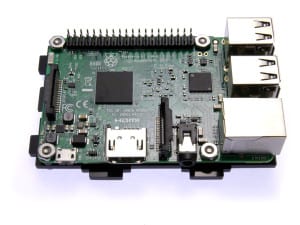
Slide the Raspberry Pi onto the bolts. The Pi is designed for metric M3 hardware, but we're still using imperial #4 hardware, which is a smidge bigger. The bolts may need to be screwed through the holes in the Pi.
Add the #4 nuts, and tighten them down.
4. Adding 3 of the 4 Sides
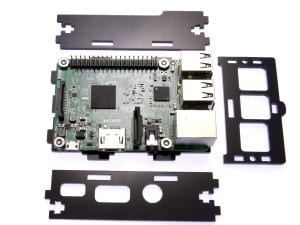
Arrange the sides as shows. The sideplate on the top in this image has the long cutout to accommodate a ribbon cable from the 40-pin expansion port. The front faceplate on the right (with the label engravings face-down) is for the communications side. The sideplate on the bottom has the ports for the power, video, and audio I/O.
Align them all up on the baseplate, and use a pair of 4-40 nuts and bolts to lock them in place.
5. Adding the SD-Card / LightPipe Faceplate
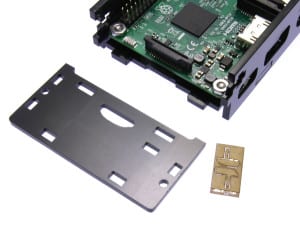
Lay the final side faceplate face-down beside the assembly, and pop the clear lightpipe parts out of their holder. It is not necessary to strip the paper off this part.
Sandwich the two lightpipes together, and push them into the lightpipe indicator hole. They will sit a bit loose until the faceplate is attached to the baseplate.
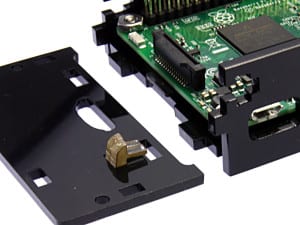
Carefully assemble this assembly to the baseplate, and finish attaching it with the remaining 4-40 nuts and bolts.
Step 6: Top Plate mounting
Notch the top plate into the slots in the rear faceplate, and gently flex the frontplate out to let the tab snap into place. You're ready to power up, with full access to the indication LEDs on the Pi mainboard via the lightpipes!
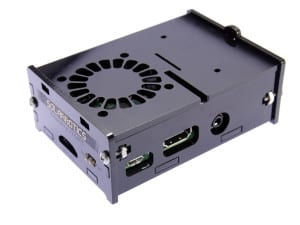
.
MORE POSTS
Wee, more protoboards! Now this is the last batch, we don't got no more. Next time it will be something else, I promise. PadBoard-1 Pad-per-Hole, 80x50mm Solder Protoboard $3.75 A tight and tidy one-pad-per-hole, plated-through, double-sided board. Ideal for wildly-wired, small projects! PadBoard-2, Pad-Per-Hole, 80x100mm Solder Protoboard $6.82 For the ultimate in protoboard flexibility, here's […]
The America Solar Challenge finishes here in Calgary tomorrow (July 27) betweein 11 and 3:30pm! The teams are coming up over McKnight Blvd., which isn't far from our offices. We'll be out watching them go by for a few hours tomorrow, so if the phones don't get answered for a bit, you'll know why. Go […]
A Batman Jacket Made With 10,000 Lego Bricks Lego and Batman rolled in one? Geek factor level 80. (Via Fashionablygeek.com) Japanese Scientists Artificially Pollinate Flowers with a Bee drone Lookit this electric thing smacking the poor lily up the face! Bees are much more gentle. Save the bees. Technology is cool, but bees are better. […]
Solarbotics, Ltd. is not responsible for misprints or errors on product prices or information. For more information, please see our Terms and Conditions.
Warning: This product contains chemicals known to the State of California to cause cancer and birth defects or other reproductive harm.
Please visit www.P65Warnings.ca.gov for more information. This item was manufactured prior to August 31, 2018.

